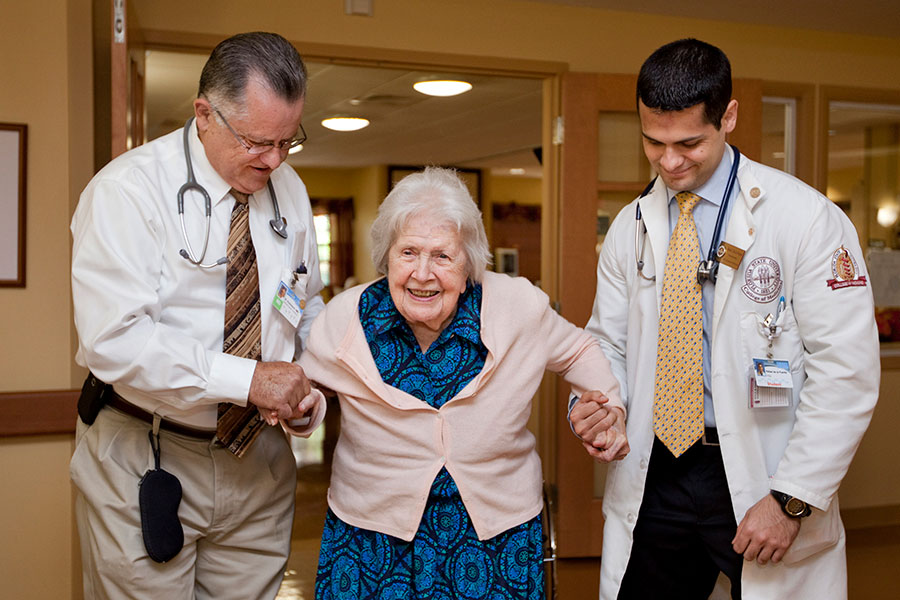
September is Healthy Aging Month, an annual national observance to focus attention on the positive aspects of growing older.
Florida State University faculty are among the global leaders in the study of gerontology, aging and longevity. These experts are available to comment on a variety of topics related to healthy aging and successful longevity.
Anne Barrett, professor of sociology and director of the Pepper Institute on Aging and Public Policy
abarrett@fsu.edu; (850) 644-8825
Barrett’s research focuses on psychosocial aspects of aging, with particular focus on how gender, social relationships and views of aging affect well-being in later life. She directs the Pepper Institute on Aging and Public Policy, FSU’s hub for multidisciplinary aging research, much of it focused on the social aspects of aging and their implications for public policy.
“In our mission to address the opportunities and challenges of an aging population, Pepper Institute faculty and students conduct research examining the social and physical features of environments that enhance our ability to age well. The two organizations connected with Pepper — the Osher Lifelong Learning Institute and Safe Mobility for Life Coalition — are great examples of programs that can support and inspire us in later life.”
Amy Burdette, professor of sociology and director of public health undergraduate program
aburdette@fsu.edu; (850) 644-1753
Burdette’s research investigates connections between religious involvement, neighborhood context and health. Her research has examined social variations in health and health behaviors at virtually every stage of life from birth to old age. Much of her research has paid special attention to disadvantaged populations.
“Religion is a powerful social institution and socio-cultural force. Research consistently shows religious variations in health and well-being. Religious involvement can promote health by discouraging unhealthy behaviors like smoking and excessive drinking and by providing social support. Religious involvement can also undermine health by discouraging healthy behaviors like contraceptive use or by stigmatizing alternative forms of pain relief. People who are active within religious communities should consider the potential benefits and risks of diverse pain management strategies, including traditional pharmaceuticals and alternative treatments like cannabis.”
Neil Charness, William G. Chase Professor of Psychology and director of the Institute for Successful Longevity
Charness@psy.fsu.edu; (850) 644-6686
Charness’ research examines human approaches to understanding aging and technology use, older driver and pedestrian safety.
“We define successful longevity as the case when someone, across their lifespan, can plan, pursue and hopefully achieve their goals. Clearly healthy aging plays a central role in enabling people to maintain the functional capabilities needed to achieve their goals.”
Miles G. Taylor, associate professor, Department of Sociology
mtaylor3@fsu.edu; (850) 644-5418
Taylor’s research examines the way early life statuses and experiences shape access to resources and the progression of physical, functional and mental health as individuals age into and throughout older adulthood. Her work also regularly examines family relationships at different stages of the life course.
“Caregiving is more complex than ever. There are more older adults but fewer caregivers in families due to reduced family sizes and increasingly diverse family forms. Care recipients have greater medical needs and treatments, and the health care landscape is difficult to navigate. Caregivers need to ‘count’ many forms of care in their assessments of time and burden to provide an accurate picture of what caregiving entails today. Policymakers and the health-care sector need to consider the increasingly complex demands placed on caregivers in discussions of long-term care.”
Dawn Carr, assistant professor, Department of Sociology
dccarr@fsu.edu; (850) 644-2833
Carr’s ongoing interdisciplinary research focuses on understanding the complex pathways between health and active engagement during later life, especially the impact of transitions in health, productivity and caregiving.
“People sometimes say ‘50 is the new 30,’ which recognizes that as a whole, we’re pushing old age out further chronologically than where it was in the past. This also is an indication that the expectations about what it means to be ‘old’ are changing as well. As we learn more about all of the things that are most strongly related to living longer lives — e.g., eating well, exercising, getting a college degree, having access to good quality health care — we need to find ways to ensure that everyone is getting access to these benefits, not just a select few.”
Judy Delp, professor, Department of Biomedical Sciences
Judy.delp@med.fsu.edu; (850) 645-1868
Delp’s research focuses on cardiovascular adaptations to aging and exercise training. Specifically, she is interested in adaptations of the microcirculation in the heart and skeletal muscle that occur with aging.
“Exercise and physical activity are critical components of healthy aging. Emerging evidence indicates that physical activity is a cornerstone to prevention of age-related cardiovascular disease. Overall, physically active individuals live longer, healthier lives.”
Jean Munn, associate professor, College of Social Work
jmunn@fsu.edu; (850) 644-9847
Munn is an expert on aging with particular expertise in gerontological social work research, specifically in the areas of long-term care, interdisciplinary health care teams and end of life.
“Successful aging involves facing life, including the end of life, with integrity. Successful aging comes from knowing that one’s life is unique and that all of life’s experiences — both positive and negative — have been learning opportunities that result in the wisdom that is unique to older adults. Happiness at this stage in life often comes from relationships, not achievements. Family relationships are most important, especially those with children and grandchildren. Health is an issue, but most older adults must deal with some health issues. These need not be the antithesis of successful aging; managing these health issues, rather than the lack of them, is the mark of success. Finances also are important; however, it may not be the amount of money so much as the ability to enjoy what one has. Finally, I believe there is a spiritual element that allows older adults to see one’s life in perspective, as part of something larger than oneself.”




